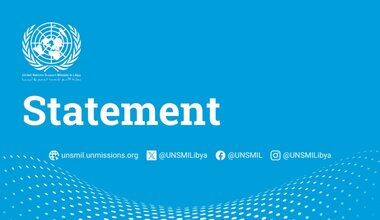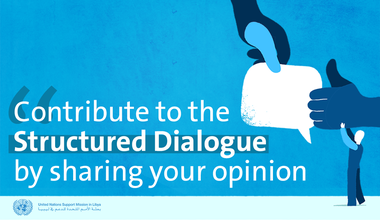SRSG Bathily co-chairs a high-level session of the International Humanitarian Law and Human Rights Working Group in Tripoli
TRIPOLI – The Special Representative of the Secretary-General of the United Nations in Libya, Abdoulaye Bathily, today stressed the need “to work together to ensure centrality of human rights throughout all stages of the political process in Libya,” including during the preparation for comprehensive national elections, emphasizing the interdependence between “the rule of law, human rights and elections” and their importance in establishing responsible and accountable institutions.
This came during his co-chairing in Tripoli of a high-level plenary session of the International Humanitarian Law & Human Rights Working Group of the International Follow-up Committee emanating from the Berlin Process with Presidential Council President, Mohammad Menfi, the Assistant State Secretary of the Swiss Federal Department of Foreign Affairs, Simon Geissbühler, and the Netherlands Ambassador for Human Rights, Bahia Tahzib-Lie. The meeting was attended by Presidential Council Vice-Presidents Abdullah Al-Lafi and Musa Al-Koni, the Minister of Justice in the Government of National Unity, Halima Abdel-Rahman, and representatives of the Ministry of Foreign Affairs, the Office of the Attorney General, the Supreme Judicial Council, and a number of diplomatic missions accredited to Libya. Deputy SRSG, Resident and Humanitarian Coordinator for Libya Georgette Gagnon also attended the meeting.
"When we refer to the centrality of Human Rights, we mean inclusion and representation that allows all Libyans, women and men, youth, victims of violence, and marginalized and disadvantaged groups to participate meaningfully in all efforts to secure peace," SRSG Bathily said.
He identified two enablers of elections, including a free and open space for civil society, and rule of law institutions that protect the rights of all Libyans, without distinction.
"Any regulatory framework should explicitly protect the fundamental rights to freedoms of expression, assembly and association and promote and protect the work of civil society organizations and human rights defenders,” he said.
SRSG Bathily also reiterated his conviction that any remaining challenges on the path to elections and national reconciliation can be overcome “with mutual trust, shared political will, and principled actions.”
At the end of the meeting, a Declaration of Intent was signed with aim of centralising human rights in the ongoing political and reconciliation processes, including through inclusive dialogues, exchange of expertise, best-practices, and experiences that will enable the effective mainstreaming of human rights into the different tracks of the Libyan political process.
 United Nations Peacekeeping
United Nations Peacekeeping UN
UN














